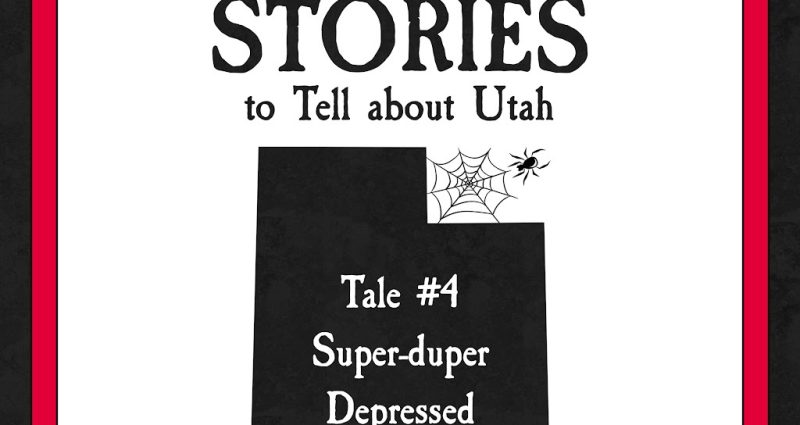Other articles in the series include: Are Utahns Uniquely Drawn to Pornography?, Do Utahns Struggle With Body Image More Than Others?, Are Religious LGBT Youth in Utah More (or Less) Prone to Suicidality?
One final favorite Scary Story people love telling about Utah centers around just how depressed people are in the state! Much of this was initially generated by an oft cited Deseret News story from 2007, referring to Utah as the most depressed state in the country. A year earlier, the Deseret News reported that a pharmacy benefits company released a study claiming that Utahns took more anti-depressants in 2000 than any other state. (2019 statistics reported that Utah ranked 16th in antidepressant use).
Since then, many nod knowingly when this tale of rampant depression in Utah is invoked. Some go on to sermonize about perfectionism and guilt among the state’s dominant religious community as presumably one of the factors fueling heightened depression. That, of course, fits nicely with those who see religion generally (and the Church of Jesus Christ of Latter-day Saints specifically) as somehow exacerbating many of the various emotional and behavioral struggles increasingly epidemic in modern society.
There will always be a handful of studies or “scholarly analyses” that can be used to claim scientific backing for one’s own world view. It becomes problematic, however, when a broader picture of research goes directly counter to deeply held views and assumptions. Just as we have witnessed in this series with popular narratives of addiction, plastic surgery, and youth suicide being challenged, you might be surprised how much the prevailing scary story of depression in Utah is contradicted by available evidence. This broader scope of evidence counters much of the popular perception that somehow faith and religious observance are core causes of depression.
When it comes to mental health, the evidence is similarly compelling in confirming a generally positive association with faith and religious adherence. For instance:
A 2012 large scale review of religious and spiritual factors influencing depression concluded “Of the 178 most methodologically rigorous studies, 119 (67%) find inverse relationships between religiosity and depression, while in contrast, only 6% report greater depression. Religious beliefs and practices may help people to cope better with stressful life circumstances, give meaning and hope, and surround depressed persons with a supportive community.”
- A 2014 study in the Journal of Religion and Health “of nearly 2,500 young women finds that across all participants, more frequent religious attendance and a strong prayer life were significant predictors of lower rates of depression.”
- In a 2016 study of religion and depression in adolescence, the researchers concluded “Using a nationally representative sample of adolescents in the US, we find robust effects of religiosity on depression that are particularly strong for the most depressed. These effects are not a result of social context. Instead, we find that religiosity buffers against stressors, possibly through improved social and psychological resources.”
- In a 2021 study just released regarding community connectedness during the COVID-19 pandemic, study co-author Dan Cox referred to Latter-day Saints in relating that, “In terms of their social connectedness, they’re doing way better than than your average American. This has a whole host of benefits. We know that loneliness is incredibly damaging to your emotional health, to physical health, so being rooted in these communities, having people they can rely on to weather something like a pandemic, which for many folks was socially isolating, is just an incredibly good position to be in.”
This same positive religion-mental health pattern also shows up in specific studies aimed at members of the Church of Jesus Christ of Latter-day Saints also. For instance:
- One earlier analysis of 1990’s data showed that the suicide rate among active Latter-day Saint youth was lower than it was for peers from 1991-1995.
- Another study using 1996 data showed that active Latter-day Saints had the best health status compared with other populations, and consequently, the lowest levels of mental illness.
- A Gallup “Well Being Survey” conducted in 2012 documented that in the United States at the time, “Jews and [Latter-day Saints] have the highest well-being of any of the faith groups examined in this analysis.”
- A 2016 study with a survey size of 1.3 million people showed that members of the Church in the United States report a high number of positive emotional experiences and relatively high life satisfaction.
None of this is to suggest that people of faith, and more specifically members of the predominant religion in Utah, don’t also struggle (even mightily) with depression and anxiety—as also shows up clearly in other studies. For instance more recently in 2019, the Center for Disease Control reported that Utah had the 6th-highest suicide rate.
But as a whole, this broader scope of evidence counters much of the popular perception that somehow faith and religious observance are core causes of depression, and act as negative risk factors for mental health. Based on the preponderance of available evidence, that’s simply not an honest scientific story.
Different mental health outcomes according to how faith is practiced. So why do some people insist that their experience with faith was so emotionally unsettling and burdensome? A fair question to explore is how certain kinds of personal approaches to faith relate to healthy or unhealthy emotional outcomes.
Many years ago, Albert Ellis famously claimed at the American Psychological Association convention that religious commitment led people towards worse mental health when compared with the general population. At the time, he was debated by Latter-day Saint psychologist Allen Bergin—who began conducting research over the next decade that would eventually force Ellis to back off his blanket generalization.
It was actually more complicated than either man acknowledged. Rather than religiosity helping or hurting mental health in a simplistic, blanket sense, deeper analysis showed that mental health outcomes depended on how, why, and to what extent people participated in their faith. For people “intrinsically committed” (finding living their faith as personally rewarding), the research was clear: that faith commitment was most often beneficial to mental health overall. A foundation of faith is generally protective against mental health problems.
For purposes here, instead of focusing alone on whether someone is spiritual or religious, it may be more relevant to ask someone more personally: how am I spiritual or religious? Why am I practicing my faith the way I do? Does how I adhere to my faith influence how I feel? Am I being religious for external reasons—or to keep up a certain appearance? Or are there deeper reasons for my religious practices?
This distinction shows up in other research too. For instance, a study of older residents of Cache County in the late 1990s suggested higher depression rates among Latter-day Saints compared with non-Latter-day Saints, but found church attendance was correlated with lower depression. And in the analysis of 1996 Utah data referenced above, active Latter-day Saints were measurably healthier than non-Latter-day Saints and less active Latter-day Saints.
It’s not hard to imagine how inner turmoil, which often manifests itself as emotional struggle, could arise for someone who has, at one stage, exhibited strong commitments practicing core teachings of a faith. When these practices are later ignored, or a person moves toward a more “extrinsic” way of practicing faith in their life, it would make sense this might create a dissonance that is not without precedent, and is described throughout scripture. For example, King Benjamin raises concern with those who “cometh out in open rebellion against God”—noting that “if that man repenteth not … the demands of divine justice do awaken his immortal soul to a lively sense of his own guilt, which doth cause him to shrink from the presence of the Lord, and doth fill his breast with guilt, and pain, and anguish, which is like an unquenchable fire.” The results of open rebellion, as opposed to a lessening of commitment to one’s faith, may be open to debate here—but it should surprise no one to see challenging emotions arise in both cases.
Faith interacts with other strong variables in influencing mental health. According to the broader picture of evidence then, a foundation of faith is generally protective against mental health problems, particularly when practiced actively and lived intrinsically.
Clearly, there are many more, wide-ranging influences on emotional health—including some that may uniquely operate in and out of Utah (and explain some of the state-level differences).
One of the most commonly cited factors, for instance, is Utah’s high elevation (third highest average elevation in the US at ~6,100 feet above sea level)—with studies often connecting depression and suicide rates with elevation, and similar correlations showing up in other high-altitude states. As just one example, a 2011 study shows a positive association between altitude and suicide rates (a helpful discussion as to possible reasons why is found here).
There is another factor at play here—far less commonly cited—but which there is good reason to believe may be playing a unique role in Utah’s mental health trends. As stated above, Utah is currently ranked 16th in the nation for antidepressant use per capita (with studies a decade earlier placing the state as first in antidepressant usage per capita).
If it’s true that Utah has a relatively high antidepressant usage rate, it raises some important questions, with the first of them being why?
Whereas most people leverage this data as easy evidence that Utahns are just more depressed (widely seen as a proxy judgment on Latter-day Saint teaching), that once again, simply does not account for all this other data above. Even more specific statistics by locality unsettles that story even more. For instance, geographic studies indicate that many areas in Utah with significant Latter-day Saint populations are less likely to use antidepressants. For example, Utah County has one of the highest Latter-day Saint populations in the state, but the Utah Department of Health reports that Provo—the largest city in Utah County—has the lowest antidepressant usage in Utah. Idaho also has a large per capita Latter-day Saint population, but it is below average for antidepressant usage.
Rather than making blanket inferences concerning religiosity and depression in connection with antidepressant use, could the higher use of antidepressants be considered a potential variable in increased rates of depression and suicide? There is some surprisingly robust data suggesting the answer is yes—especially these three findings:
- A growing and sizable amount of research confirms unique levels of risk in young, developing, teenage brains when they are prescribed antidepressants—with a roughly doubling of suicidality showing up across many controlled trials (summary review here).
- There are also seven different lines of evidence that confirm a linkage between antidepressant use and uncharacteristic suicidality generally
- Finally, twenty-two long-term studies document a trend of worsening depression over time for those taking antidepressants 5, 10, and 15 years in a row—when compared with those who never take them (complicated by the fact that these medications can be difficult to taper off, as the New York Times investigated in 2018).
A logical conclusion to this information may be that whatever short-term benefit one may continue receiving from an antidepressant initially, it’s hard to deny a more complicated picture emerges over time. Unfortunately, it seems increasingly clear from population level data that the more a population embraces these treatments as the primary response to depression—the more their burden of suicidality and chronic depression will grow.
All of this raises some challenging questions about the overall approach we continue to take in responding to mental health challenges. It was respected scholars Allan Horowitz and Jerome Wakefield who raised concern in their 2012 book Loss of Sadness with “medicating normal sadness” for the way it often “treats as pathological what is actually an inherent and valuable part of the human condition.” As they summarized:
For thousands of years, people have used religion, spirituality, and philosophy to understand how their unhappiness is tied into larger questions about life. Such questioning allows people to comprehend how their emotions are related to basic aspects of human existence and to gain a deeper appreciation of their feelings ….Quite aside from philosophical issues, there may be psychological benefits of normal sadness that treatment would nullify. We do not as yet fully understand why we are biologically designed to experience sadness in response to loss, and, until we do, it is possible that there are benefits of withdrawing into a sad state after a major loss that are not immediately apparent but that are nonetheless real and important to long-term psychological functioning.
Having said all this, let’s be clear that antidepressants have helped millions of people, and untold numbers of people in Utah. I am certainly not advocating that those taking antidepressants immediately stop taking the medication. (When that is the right step, it needs to happen very, very gradually—and ideally with lots of support and some medical supervision). So, this is not an anti-medication message—it’s about being thoughtful in our use of medication and cautioning against over-relying on this as our long-term solution, including for youth. What research is showing is that they may not necessarily be the best first choice, and that there are other options which can and should be explored for those suffering from depression. “There may be psychological benefits of normal sadness that treatment would nullify.”
- Believing there was hope in the possibility of deeper healing
- Making small and large life adjustments in their lifestyles
- Prioritizing the big three—nutrition, physical activity, and sleep
- Not neglecting the ‘other big three’—mental diet, mental activity, and mental rest
- Working through issues of trauma, healing and forgiveness
- Learning to work with thoughts and emotions in a new way
- Nourishing community & emotional support
- Seeing your own self and life as having true worth, meaning, and purpose
- Deepening or realigning your spiritual connection
- Growing freedom through less emotional dependence on substances or behaviors.
It’s worth pointing out that all ten of these shifts are well-represented in the teachings of every major faith—including the Church of Jesus Christ of Latter-day Saints. Rather than targeting faith as somehow detrimental to emotional health overall, then, maybe it’s time to recognize the profound salutary and preventive effect faith can and does play for so many—in and out of Utah.
So, is Utah more depressed than other places? You’d have to try really hard to make that case based on the available scientific data. Let’s stop pretending that Scary Story is somehow research-based and backed by good evidence.
It’s not. The story that is backed by the broader picture of evidence is much more encouraging about Utah and the strong influence of faith than many have been led to believe.










